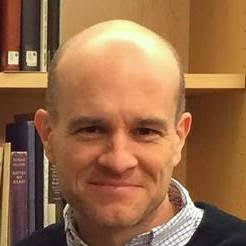Frank Boscoe
Research Scientist, New York State Cancer Registry

Education: Ph.D. in Geography (Penn State University), M.A. in Geography (Kent State University), B.S. in Civil Engineering (Carnegie Mellon University)
Describe your job. What are some of the most important tasks or duties for which you are responsible?
I would describe my primary responsibility as finding interesting and useful applications of the vast amount of cancer data collected by the State of New York. These tend to revolve around several themes: Why are there different cancer rates in different places? What makes some people live longer with cancer than others? Which cancer treatments work better than others? In pursuing these questions, I get to work with many outside researchers from hospitals and universities.
What attracted you to this position/career path/organization/industry?
As with so many careers, there was an element of chance. In 1999, before my Ph.D. was even completed, I applied for a number of jobs from government to private industry to academia. The job I landed is the one I thought I was least likely to get. But at the time, New York was interested in producing some detailed cancer maps, and my graduate school work on the design of a digital disease atlas made me attractive for the job.
How has your education/background in geography prepared you for this position?
What has been most valuable has not been the specific technical skills (I don’t do a whole lot of GIS, in fact), but the repeated application of geographical thinking: repeatedly asking the question, why does something exist more in one place than in another place? Approaching problems from that angle often leads to an insight no one else has had before.
What geographic skills and information do you use most often in your work? What general skills and information do you use most often in your work?
I find that if an effect is strong enough to matter to public health, it will be evident through maps and scatterplots and straightforward regression models. More sophisticated methods can help tease out subtle differences, but while these may be statistically significant, they are rarely clinically significant. In other words, we needn’t worry too much about differences of 10% when there are enough 50% and 100% differences to go around. Accordingly, I still rely quite heavily on the spatial analysis techniques and methods I learned in my master’s level courses, in particular.
A general skill that I use daily is the seemingly simple one of counting and categorization. Do these two different records represent the same person, or not? Did this patient have cancer, or was it pre-cancer? Did these people actually live in New York during the study period? Is this person still alive, or just lost to follow-up? Ignore these questions, as many researchers do, and your study will be biased. But spend too much time on them, and you’ll never finish anything. The trick is to make quick but defensible decisions, something that sounds easy but really benefits from years of experience.
Are there any skills or information you need for your work that you did not obtain through your academic training? If so, how/where did you obtain them?
I use a commercial statistical software package called SAS every day; it is ubiquitous in public health. I had to teach myself on the job. During graduate school, I had done some coding in other (now obsolete) languages, so it was not too difficult of a transition.
Do you participate in hiring, screening, or training of new employees? If so, what qualities and/or skills do you look for?
I am involved whenever a junior research scientist position opens up, typically once every few years. I have found the most useful part of an interview is to show the candidate a cancer map and ask them to speculate on what might be causing the patterns and trends they see. No one has ever given an especially accurate answer; we choose the ones who generate the most interesting hypotheses.
What advice would you give to someone interested in a job like yours?
Take an introduction to public health or introduction to epidemiology course while pursuing your geography degree. If these disciplines are not available at your school, there are outstanding courses available online through sites like Coursera. Don’t worry that it will not appear on your official transcript; I have never looked at anyone’s official transcript.
What is the occupational outlook for career opportunities in your field/organization, esp. for geographers?
It is still strong despite some current short-term funding pressures. The average age within my field is in the 50s, and retirements are outpacing recruitment. I myself am almost 50 and still occasionally find myself to be the youngest person attending a meeting. There has been some progress against cancer during my career, but there is still much more that we don’t know than we know. We will need plenty of smart people to help collect and interpret cancer data for the foreseeable future.